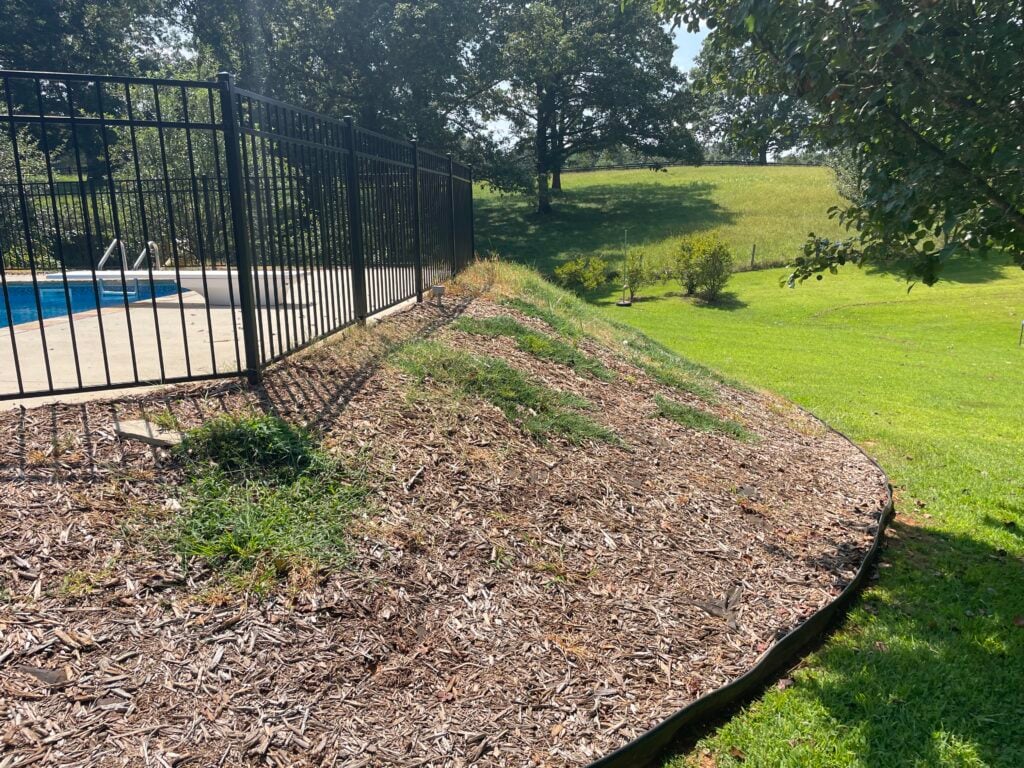How to maintain stability in Steep hill landscaping projects.
How to maintain stability in Steep hill landscaping projects.
Blog Article
Attain a Beautiful Outdoor Sanctuary With Thoughtful Steep Hillside Landscaping Solutions
Transforming a steep hill right into a fascinating outside oasis offers one-of-a-kind difficulties that need innovative landscape design remedies. By resolving problems such as erosion control and accessibility, one can develop a harmonious blend of elegance and performance. Techniques such as terracing, the installment of preserving walls, and the selection of indigenous plants play vital functions in this process. In addition, integrating water attributes can additionally enhance the landscape's attraction. Comprehending the details of these aspects is essential for attaining a truly natural and inviting atmosphere. What strategies will best fit your hill's particular features?
Recognizing Steep Hillside Obstacles
Landscape design on high hillsides provides special difficulties that need cautious consideration and tactical planning. The inclination of the terrain can lead to issues such as dirt disintegration, water drainage, and restricted availability, every one of which should be resolved to develop a practical and aesthetically pleasing outside area.
One of the key worry about steep hill landscape design is disintegration, which can arise from hefty rainfall or improper water drainage. This not just impacts plant health and wellness but can additionally threaten the stability of the slope. Applying reliable erosion control measures, such as growing deep-rooted vegetation or making use of compost, is vital in preserving the honesty of the landscape.

Creating With Terracing Strategies
To mitigate the challenges positioned by high hillsides, incorporating terracing strategies can be a reliable solution. This design approach transforms a sloped landscape right into a series of flat, level areas, creating a visually striking and functional outdoor space. Terracing not only helps to avoid soil erosion but also helps with much better water drainage, which is essential in preserving the health of plants and the stability of the hillside.
When designing balconies, mindful factor to consider of the incline's angle and the soil type is important. Each terrace should be strategically positioned to maximize sunshine direct exposure while lessening the danger of runoff. Making use of indigenous plants on each degree can improve biodiversity, promote sustainability, and reduce upkeep requirements. Additionally, incorporating paths between terraces can boost availability and motivate exploration of the landscape.
Terraced yards can serve numerous functions, including veggie production, decorative displays, or exterior seating locations. By using products that blend sympathetically with the surrounding atmosphere, the terracing can boost the general visual charm of the home. Ultimately, thoughtful terracing changes high hills right into practical, attractive areas that welcome interaction and satisfaction.
Executing Preserving Walls
When confronted with the challenges of steep surface, implementing maintaining wall surfaces can offer both architectural support and aesthetic enhancement to a landscape. These wall surfaces serve to stop soil erosion, maintain inclines, and create level locations for gardening or leisure usage. Steep hill landscaping. By effectively handling useful link water overflow and lowering soil motion, maintaining wall surfaces protect your landscape investment while boosting safety and security

Expert installation is critical to make sure the durability and performance of maintaining walls. Correct drain systems have to be integrated to alleviate hydrostatic stress, stopping architectural failure. Consulting with landscape professionals will ensure that the style aligns with your general vision while sticking click for source to regional laws.
Picking Indigenous Plants
Selecting indigenous plants for your landscape design uses numerous environmental and visual benefits. Steep hill landscaping. Native plants are adapted to the regional environment and soil conditions, calling for less water and maintenance contrasted to non-native species. This versatility not just conserves resources yet also promotes a healthier ecological community, as native plants support neighborhood wild animals, including pollinators such as bees and butterflies
Including indigenous flora into your high hill landscape design can enhance soil stability, lowering disintegration and promoting a balanced ecological community. Deep-rooted native plants assist secure the dirt, making them ideal for sloped areas. Moreover, these plants often exhibit dynamic shades and varied appearances, developing an aesthetically appealing landscape that harmonizes with the surrounding environment.
When picking indigenous plants, consider their development behaviors, seasonal interest, and compatibility with various other varieties. Organizing plants with comparable water and sunshine demands can lead to a much more cohesive style, while also simplifying maintenance. By picking indigenous plants, you not just cultivate a sustainable outdoor oasis but additionally add favorably to the regional biodiversity, guaranteeing that your landscape flourishes for years to come.
Incorporating Water Attributes
Including water attributes into your steep hillside landscape design can substantially improve both the aesthetic allure and eco-friendly performance of the space. The audio of moving water produces a peaceful atmosphere, while aesthetically, it can serve as a focal point that attracts the eye and adds depth to the landscape.
When picking water functions, consider alternatives that match the natural shapes of your hill. Waterfalls, as an example, can waterfall down the slope, developing visual passion and advertising healthy water drainage. Ponds can additionally be integrated right into the style, click for more info encouraging regional wildlife and supplying habitats for numerous species.
In addition, the placement of plants around these features is vital. Indigenous aquatic plants not just enhance the appeal of the water feature however also add to its ecological balance by filtering system contaminants and giving food for local animals.
Upkeep is another crucial factor; make sure that your water feature is developed for very easy upkeep. An effectively constructed function will certainly require minimal treatment, permitting you to take pleasure in the beauty and serenity it uses without excessive labor. Eventually, attentively incorporated water attributes can change your high hill landscape right into a fascinating outside oasis.
Final Thought
In final thought, transforming a high hillside right into a lovely exterior sanctuary demands thoughtful landscaping techniques that resolve disintegration control and ease of access. The integration of terracing strategies, the application of preserving wall surfaces, and the option of native plants are important components of effective style.
Report this page